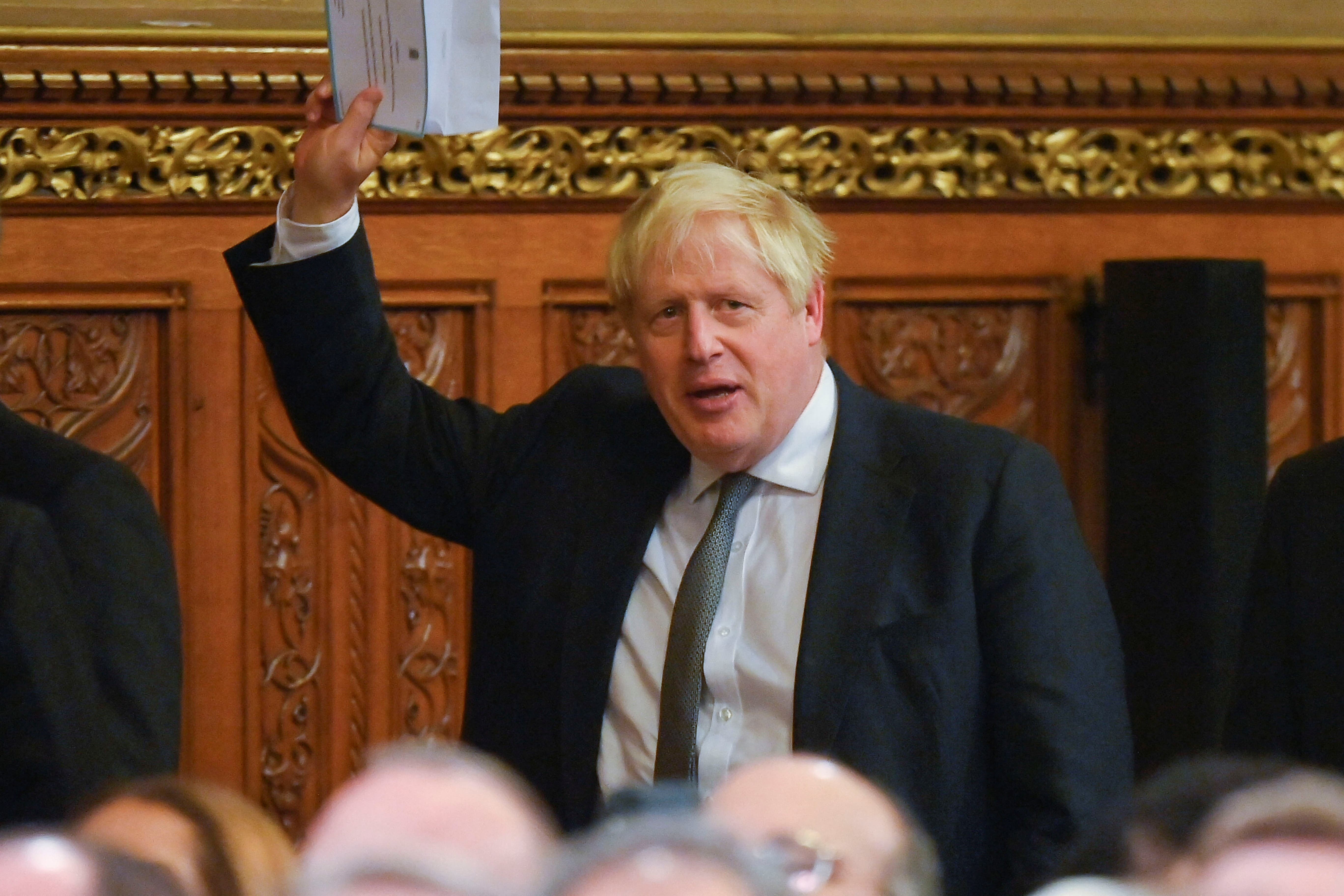‘There is no vision’: Can Rishi Sunak turn the Tory ship around before the next election?
The prime minister will hope 2023 is a quieter year than this one, writes Andrew Grice. But it cannot be too quiet. Boring is not enough; it won’t win at the ballot box


Will 2023 be a year of relative calm before an inevitable storm blows the Conservatives away in 2024? Or will the next 12 months see Rishi Sunak chip away at Labour’s opinion poll lead, making the next general election a much closer contest than many expect?
As the parties begin to define the battle lines for a 2024 contest, both scenarios are possible. But for the Tories to recover, Sunak will have to become a different prime minister to the one who necessarily steadied the ship after the turbulence of Liz Truss’ disastrous, mayfly premiership.
Many Tory MPs, while welcoming the stability Sunak has brought, insist that it is not enough. Some suspect the PM’s real mission is to “manage decline” and prevent a 1997-style landslide defeat that would potentially give Labour two five-year terms in power.
However, Sunak and his advisers insist there is a route to Tory recovery and an unprecedented fifth term. A workaholic PM with forensic attention to detail and data will not fail because he did not strain every sinew.
Allies admit Sunak will have to change his governing style. After bringing financial and political stability, the next stage will require him to say more about his vision for the country. “Rishi is a dry managerialist,” one Tory backbencher groaned. A former minister added: “He’s a technocrat who looks like he is reading out words written by somebody else. There is no vision because he doesn’t stand for anything.”
It isn’t all his fault. Sunak inherited a Tory identity crisis: since the 2016 EU referendum, the party has been better at blaming others for the UK’s problems – the EU; the civil service “blob”; the Bank of England or “Treasury orthodoxy” (now back in fashion) – than offering a coherent post-Brexit strategy.
It seems Sunak will try to answer the criticism that voters don’t know what he stands for: there is a plan for town hall-style “meet the people” events, which David Cameron deployed. To repair the damage to the Tory brand inflicted by Truss and Boris Johnson, Sunak will have to deliver on the five issues he is rightly prioritising – the economy, the small boats crisis in the Channel, the NHS, education and a new offer to the younger generation.
However, showing “delivery” will not be easy when the new year starts with a wave of public sector strikes, fuelling an impression that “Britain isn’t working”. While Sunak has announced a plan to stop the Channel crossings, aides admit it is only a start. The NHS’ problems are also intractable, and the strikes will add to its record 7.2 million-strong waiting list. Scrapping some top-down targets for NHS England, Sunak’s most likely health reform, will not improve the experience for patients overnight. Boosting vocational education and skills, which he sees as his personal mission, is also at best a medium-term goal.

On the economy, many Tory backbenchers hope Jeremy Hunt will use his first Budget on 15 March to produce a “more Conservative” package than the £25bn tax hike he announced in his November autumn statement. With minds turning to the election, these MPs hope an improving economic picture, with inflation expected to halve during a relatively mild recession in 2023, will revive the prospect of tax cuts. But with the public finances in need of repair in Sunak’s eyes, the MPs may have to wait longer. And for voters facing higher energy bills in April, the cost of living crisis will get worse before it gets better.
Sunak’s relationship with his fractious MPs will be a key feature of 2023. After seeing Johnson and Truss ousted, he is working hard to build bridges. In the face of backbench revolts, he backed down over mandatory housebuilding targets for local authorities and dropped his opposition to onshore wind farms. True, one person’s climbdown is another’s compromise and Sunak arguably had to sue for peace after nine months of Tory civil war made his faction-ridden MPs look ungovernable.
But his tactical retreats raised an important question. As one senior Tory told me: “Can Sunak do anything that is vaguely controversial? If he does, will we see more revolts followed by more climbdowns?” His party’s addiction to rebellion makes Sunak’s comfortable working majority of 69 much smaller in practice. If he doesn’t become bolder, Tories will accuse him of sleepwalking to electoral oblivion. But if he makes more U-turns, Labour will again portray him as “weak”, in contrast with Keir Starmer who, after running for the leadership on a “Corbynism without Corbyn” ticket, has distanced his party from the hard left. One Labour strategist said: “Elections usually come down to a battle over which candidate for prime minister is weak and which is strong. This is very favourable ground for us.”
Can Sunak do anything that is vaguely controversial?
The PM will have to choose his internal battles carefully. He wants a deal with the EU on the Northern Ireland protocol, in time for Joe Biden to visit the UK and Ireland to mark the 25th anniversary of the Good Friday Agreement in April. (Biden probably wouldn’t come in the absence of a settlement). But concessions to the EU would be hard for some hardline Brexiteers to swallow.
Legislation on small boats should unite Sunak’s party and, by keeping alive the controversial plan to send some asylum seekers to Rwanda, the Tories hope to portray Labour as “soft” on illegal immigration. Whether any flights take off to the country in 2023 is another question; “delivery” will again be a huge challenge for Sunak. He will likely buy time for more legislation by delaying the first King’s Speech of King Charles’ reign from the spring to the autumn but doing so will not guarantee his rebellious MPs give his measures a smooth passage.
Many of them have ringed 4 May as the most important day of 2023. Local elections in many parts of England outside London will provide Sunak’s first big test at the ballot box. Results in the Tory “blue wall” strongholds in the South, and the North and Midlands “red wall” invaded in 2019 will provide crucial general election pointers. The Tories did badly when the seats up for grabs were last fought in 2019 under Theresa May’s faltering leadership and so Sunak must do better. Poor results would persuade more Tory MPs to announce they will stand down at the general election, making it harder for Sunak to give his party the crucial ingredient of hope.
Two people will study the results in May with more than a passing interest. Nigel Farage is hinting at yet another comeback. Although Reform UK, the Brexit party’s successor, is unlikely to win seats at a general election, it could split the Conservative vote and we shouldn’t underestimate Farage’s power to destabilise a jittery Tory party.

A more immediate threat to Sunak could be posed by Johnson. Incredible as it might sound, the aftermath of the local elections – after a brief pause for the coronation of King Charles – might be the moment Johnson chooses to mount a leadership challenge. Johnson’s circle has convinced itself (wrongly) that Sunak plotted for months to push Johnson out of No 10, which conveniently ignores his self-destruction. An attempted countercoup by Johnson cannot be ruled out. The clue was in his statement when he decided not to stand against Sunak after Truss’ premiership imploded. “I believe I am well placed to deliver a Conservative victory in 2024,” Johnson said.
Tory insiders believe Johnson could win a leadership ballot among the party’s 180,000 members, who have the final say. But I think Tory MPs would block Johnson’s challenge; the public would not forgive the party for recalling such a discredited, untrustworthy leader.
Johnson might rattle Sunak’s cage by making an appearance at the Tory conference in Manchester in October – a trick he performed to undermine Cameron and May. The autumn conferences could be the last before a 2024 election. Although Sunak could delay the contest until January 2025, he will not want to be boxed in. Tory HQ originally pencilled in May 2024, but the election is now likely to slip to the autumn in the hope an economic recovery will be more visible.
The two main parties are already filling their election war chests. Labour raised more in donations (£2.7m) than the Tories for the first time in six years in the third quarter of 2022. Having regained economic credibility, Labour is winning donations from rich individuals again, making it less dependent on the trade unions. However, Nadhim Zahawi, the Tory chair, hopes to raise £15m in new donations so the party can outspend Labour.
Overtaking Labour in the opinion polls will be harder. The party enjoys an average 20-point lead – 46 per cent to 26 per cent. But there is a ray of hope for the Tories: Sunak’s ratings on the economy and “best PM” are much better than his party’s. Tory strategists point to a large number of “don’t knows” and are convinced the Labour vote is soft, largely an anti-Tory protest rather than a positive endorsement of Labour and its leader.
Although Starmer is increasingly confident, he has told his frontbenchers to avoid complacency and 2023 will be a big year for the Labour leader. A majority of voters expect Labour to form the next government, but that brings another hurdle: much more media and public scrutiny. Starmer doesn’t need an A-Z manifesto, but does now need to weave a coherent narrative telling voters how Labour would tackle the country’s huge problems and change it for the better. All while choosing to wear a fiscal straitjacket to avoid scaring the markets. Starmer will have to avoid being distracted by Tory attacks on his party – for example, on trans rights following the Scottish parliament’s vote for self-identification.
Sunak will hope 2023 is a quieter year than 2022. But it cannot be too quiet. Boring is not enough; it won’t win an election. The PM will not go down without a fight. But even if the economy emerges from the current storm and his party behaves itself, Sunak might be unable to turn the anti-Tory tide created by Johnson and Truss. Perhaps nobody could.






Join our commenting forum
Join thought-provoking conversations, follow other Independent readers and see their replies
Comments